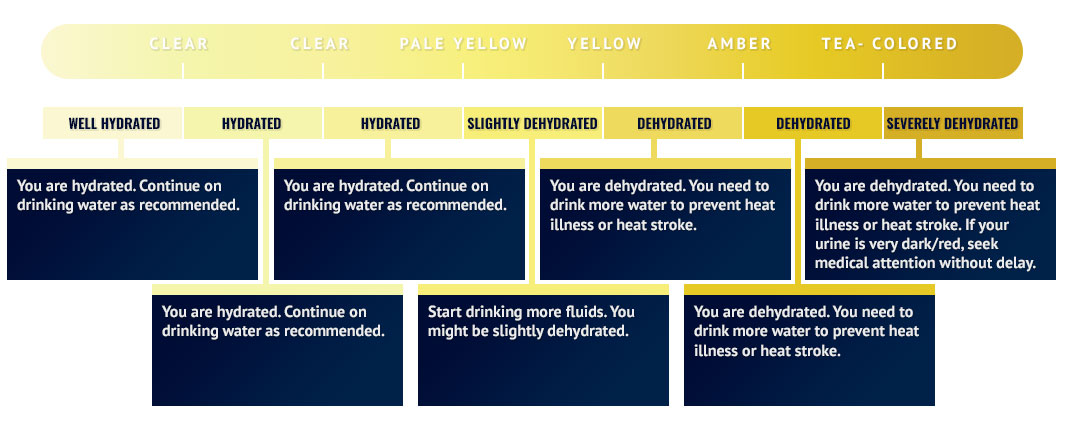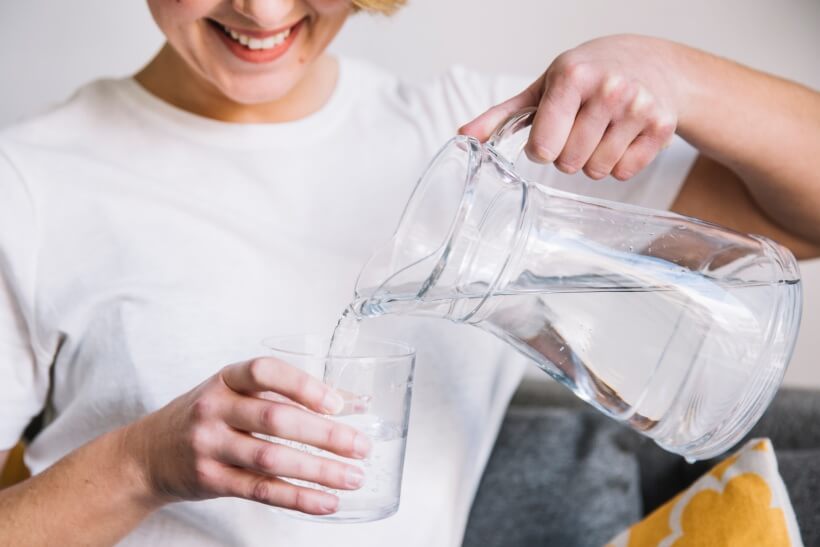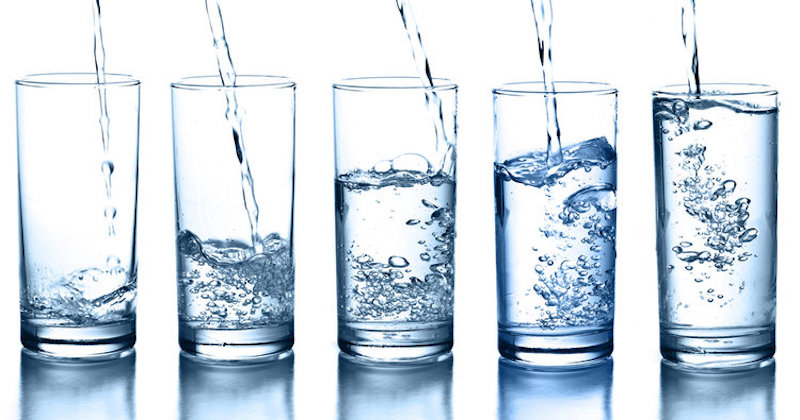Have you ever dealt with a bad headache and nothing seemed to take the pain away? Or maybe you kept feeling hungry although you just ate? We’ve looked into all the reasons why we sometimes feel a bit off without knowing why, and the findings were quite surprising.
These are just some of the signs of not drinking enough water. Let’s discuss the symptoms of dehydration and establish how much water we need in a day to avoid any possible health issues.
1. Thirst
According to the Mayo Clinic, older adults don’t start feeling parched until the body is significantly depleted of water1. Therefore, the dry sensation in your mouth and throat is more than a suggestion that you should up your recommended daily water intake.
Of course, there are other situations in which you could mistake dry mouth for thirst. Britain’s National Health Service states that this sensation might also occur as a consequence of certain medications or treatments, as well as certain medical conditions2.
2. Hunger
You would think that most of us would know how to distinguish thirst from hunger by now, right? Well, think again. More often than not, our brains do not respond appropriately to the sensation.
This is detailed in the findings of a 2008 study3 that showed that unexpected or frequent hunger pangs can indicate that you need to drink more water.
The hypothalamus in our brains regulates both hunger and thirst, and sometimes it cannot tell the difference between the two. In other words, craving food (sweet or salty) is one of the definitive symptoms of not drinking enough water.
- Go get a glass of water before you ask for the second breakfast and see whether cravings stop or not. If not, you can Hobbit away through that second round of dinner.
If you wonder how to tell if you are dehydrated, be mindful of what you crave. Your liver needs water to fuel your body with energy. When dehydration occurs, the liver cannot do its job. It signals the brain that it wants more energy – thus determining sugar and/or salt cravings, which are the easy ways out that your brain knows.
3. Changes in Urine Coloration
The color of your urine is always a clear indicator of how well your body is doing, and this includes its hydration levels and excretory processes. As illustrated by the Cleveland Clinic’s chart, the darker the shade is, the more severe the fluid depletion is4. This happens due to waste gathering in the urinary system throughout the day.
Nonetheless, dark urine is also caused by certain foods with rich colors, such as beets and blueberries. Various types of medication also cause a deepening in shade, as do some medical conditions. For this reason, it’s important to consider all the potential factors of the change before making a change in your lifestyle.

Sometimes, the answer to whether or not you’re well hydrated lies in… pee.
4. Headaches
The human brain is 73% water, according to data published in the Journal of Biological Chemistry5. When the body lacks essential fluids, it contracts and shrinks in size and pulls away from the walls of the cranium. The process causes pain and discomfort that can linger for prolonged periods of time, sometimes carrying on for an entire day.
This is known as a dehydration headache6, and it is a symptom that dramatically decreases one’s quality of life. Consuming water is indispensable in this scenario, as it is the only way to get the brain to plump back up to its normal dimension. This will relieve the aching momentarily. Still, for long-term effects, you will have to keep up with this healthy behavior.
- Headaches are a surefire warning sign that you are not drinking enough water. Keep a filtered water bottle by your side at all times and make sure you get the recommended daily water intake no matter if you spend your days at work or engaged in outdoor adventures.
- Check for headaches after this experiment. If you feel better about everything in general, you should continue to keep at bay all the symptoms of not drinking enough water – headaches and dizziness included.
5. Dry Skin
It’s no secret that skin physiology and water intake are closely related. The more hydrated your body is, the better your complexion will look7. Using moisturizers and other cosmetic products for achieving this is also crucial, but at the end of the day proper fluid intake matters the most.
Adequate hydration also ensures your skin will remain more elastic and supple for longer, and wrinkles are prevented, too.
What you need to understand is that dry skin is a skin type, while dehydration is a condition. The symptoms of not drinking enough water visible on your skin can comprise the following:
- Skin itchiness and dullness
- Darker-than-usual circles under your eyes
- Shadows on your face (under the eyes or around the nose)
- Fine lines and superficial wrinkles
- Sunken eyes
Severe dry skin issues should convince you to visit a dermatologist. Nevertheless, keep in mind your recommended daily water intake and make sure you manage the not drinking enough water problem, especially in your adult years.
“The 8 by 8 rule states that the recommended daily water intake is of eight 8-ounce glasses, which amounts to half a gallon (2 liters).”
6. Constipation
Dehydration, be it even a mild case, is one of the main causes of constipation. This is supported by a 2003 study8 conducted on otherwise healthy infants. The water inside your colon is an essential part of digestion, as it helps break down waste and lubricate it on its way out. When there is a lack of it, hard stools that are difficult to pass are formed.
This occurs due to the fact that the large intestine absorbs liquid from food leftovers, leaving them dry and difficult to digest. This is why constipation is a clear sign you’re not drinking enough water.
Speaking of digestive problems and not drinking enough water, you should also know the following:
- Water is essential for your entire digestive system. In its lack, the amount and strength of the protective mucus in your mouth, throat, and stomach go low, leading to potential health problems.
- The stomach lining needs water to play the role of a buffer between it and the acidic contents of your stomach.
- If the mucus in your stomach is on its down low level due to dehydration, the acids can play an ugly number on you, determining heartburns, frequent stomach aches, and even ulcers.
We recommend you try this experiment at home: drink two cups of water every morning on an empty stomach. You will probably feel a lot better about your bowel movements and acid reflux issues.
7. Fatigue and Other Psychological Issues
Are you always tired? Feeling drained, both mentally and physically, can have many causes, and mild dehydration is, unfortunately, one of them. According to a study conducted in 20129on a sample group of 25 women, improper water intake leads to fatigue, as well as decreased mood, confusion, and an inability to concentrate. The same research team also conducted a similar study on a group of men with comparable results.
One of the major signs you are not drinking enough water on a daily basis is that state of sleepiness and lack of energy you might feel throughout the day, even if you slept well the night before. Drink some water and be mindful about the changes in mood and energy levels in the following situations:
- You find it hard to focus on simple tasks;
- You lack the concentration to solve otherwise simple problems;
- You feel your memory and cognitive functions betray you;
- You experience dizzy spells and light-headedness for no apparent medical reason;
- You are moody, anxious, sad, or irritated.
If you spend your days in a permanent state of dehydration, your brain does not receive the necessary amount of oxygen and nutrients it needs to function properly. Some people are not themselves when they are hungry. Others act completely out of character when they are thirsty.
Find out which is which and make sure you alleviate the symptoms of not drinking enough water when you are at work for instance by keeping a nice water bottle within reach. Some of the best insulated water bottles can actually seduce you into drinking more water while you are at work.
8. Bad Breath
Saliva plays an important role in oral health10. It balances pH levels and protects your teeth from plaque with its neutralizing action. What’s more, a moist mouth is less hospitable to the bacteria that are born out of decomposing food and cells. Now imagine what happens when your mouth is dry. This is why your breath starts to smell bad when you are dehydrated.
Hence, halitosis is one of the telltale signs you’re not drinking enough water. Of course, this affliction can have many other underlying causes. But with it being a notable dehydration symptom, it’s important to consider administering more fluids once it occurs.
Not drinking enough water might not directly lead to spasms, but it certainly increases the danger of them occurring. As explained by the Mayo Clinic, dehydration is a notable risk factor in the case of muscle cramps11.
This is particularly prevalent among athletes who participate in warm-weather sports without ensuring a proper fluid intake beforehand and during the event.
- When you engage in vigorous physical training, you perspire and lose fluids and electrolytes. Drops in the sodium levels often translate into muscle soreness, as your body prioritizes the fluids left, sending them towards the circulatory system.
By having the recommended daily water intake, you avoid other connected problems as well.
- One of the major symptoms of not drinking enough water is aching joints because guess what, our cartilage and discs use water to act as a lubricant and stopping bones from grinding against each other. For this reason, you will not find any pro athlete or fitness trainer saying you should not drink water during exercises.
What happens when you do not sweat enough during a gym session?
Not perspiring during exercise is also a sign that you are not drinking enough water. If your body suffers from dehydration and has little fluid to sweat to regulate its temperature, you may face overheating, which in turn takes a toll on more than your muscles.
Nevertheless, keep in mind that caring for your musculoskeletal system goes far beyond drinking water daily.

10. Heart and Blood Pressure Problems
Did you ever spend a day out in the sun only to feel your heart pounding? Two of the most worrying signs of not drinking enough water are palpitations and hypertension. The American Heart Association explains the phenomena in simple terms: when you stay well hydrated, you allow your heart to pump up blood with ease. When you lack water, your heart works more and harder, trying to compensate. Thus, it beats faster (increases its rate), leading you to feel palpitations.
Dehydration also leads to hypertension. Since it is an emergency case, your brain signals your pituitary gland to release vasopressin, a hormone that plays a crucial role in body fluids’ tonicity regulation. When released in high concentrations, vasopressin also causes blood vessels’ constriction. In turn, it leads to increased blood pressure overall (hypertension).
11. You Don’t Lose Enough Weight
Weight loss is a massive field of study and debate. Nevertheless, we detailed on a previous occasion the fact having a proper water diet helps you with your weight loss efforts. The reverse is also valid – not drinking enough water can lead to an inability to lose weight or to poor weight loss results, no matter how hard you try.
The logic behind it is simple: water is crucial for the functioning of your kidneys, liver, digestive system, and musculoskeletal system.
- If your food craving brain and your internal organs do not have enough water to fuel their processes, most likely you deal with unsatisfactory outcomes regarding your eating/exercising weight loss program.
The Recommended Daily Water Intake: How Much Water Should You Drink in a Day?
When it comes to how much water a healthy person should drink in a day, there is no universal answer. Most of us are more than familiar with the infamous 8 by 8 rule which states that the optimal daily water intake is of eight 8-ounce glasses, which amounts to half a gallon (2 liters) in total. However, the conversation is a lot more nuanced than that.
Debunking the 8 by 8 Rule
Who came up with the 8 by 8 rule? As detailed by a study published in 2008 in the Journal of the American Society of Nephrology, nobody knows for sure12. The myth spread like wildfire, and health bloggers adopted it with open arms. However, there is no single piece of research to back this statement up. So, what is the adequate quotidian intake for the regular person?
Answering the “How much water should I drink a day” Debate
Simply put, there isn’t a unanimous amount of water each one of us should drink on a daily basis. Harvard Medical School kidney doctor and associate professor of medicine Julian Seifter, M.D. supports the claim that this is an individualized matter13. There are several factors that come into play when deciding this.

Fill your glass often to avoid dyhadration
Factors That Determine the Recommended Daily Water Intake
Age, gender, and body weight are common denominators. The older you are, the more hydration you require. This is equally true when your mass is larger than average. On top of that, men should consume more fluids on average than women, according to the National Academy of Medicine14.
- The average adult male requires one gallon (3.7 liters) of water per day, which amounts to a total of 15 glasses.
- The average adult woman, on the other hand, needs roughly 2/3 of a gallon (2.7 liters), or 11 cups.
These quantities include the water your body absorbs from food and other beverages, not including caffeinated and alcoholic ones. This is why they might seem hauntingly high.
- Fluid intake should be closely monitored and tailored to fit those with health conditions that affect the heart, kidney, or liver. This is also essential in the case of patients undergoing opiate or non-steroidal anti-inflammatory drugs (NSAIDs) treatment.
Therefore, the only way to find out how much water you should drink daily to suit your body’s specific needs is best discussed with a doctor.
The Bottom Line
Not drinking enough water can decrease the quality of our life, and we might not even be aware the solution is something as simple as grabbing yet another glass of water. Knowing how much water you need to drink in a day could help you avoid plenty of health issues. Just determine the right amount of water for your body and do whatever you can to reach it.
How much water do you drink in a day? Have you found that ideal quantity that allows you to enjoy your day without any signs of not drinking enough water?
Sources:
- Mayo Clinic. Dehydration. [https://www.mayoclinic.org/diseases-conditions/dehydration/symptoms-causes/syc-20354086]
- NHS U.K. Dry mouth. [https://www.nhs.uk/conditions/dry-mouth/]
- Physiol Behav. 2008. Relationships between human thirst, hunger, drinking, and feeding.
- Cleveland Clinic. What The Color of Your Urine Says About You. [https://health.clevelandclinic.org/what-the-color-of-your-urine-says-about-you-infographic/]
- U.S. Geological Survey. The water in you. [https://water.usgs.gov/edu/propertyyou.html]
- Jenna Fletcher. Medical News Today. 2017. Dehydration headaches: Signs, treatment, and prevention. [https://www.medicalnewstoday.com/articles/317511.php]
- Lídia Palma, Liliana Tavares Marques, Julia Bujan, Luís Monteiro Rodrigues. 2015. Dietary water affects human skin hydration and biomechanics.
- Arnaud MJ. 2003. Mild dehydration: a risk factor of constipation?
- Sarah C.P. Williams. 2012. LiveScience. [https://www.livescience.com/36106-mild-dehydration-triggers-moodiness-fatigue-women.html]
- Mandel ID. 1987. The functions of saliva.
- Mayo Clinic. Muscle Cramps. [https://www.mayoclinic.org/diseases-conditions/muscle-cramp/symptoms-causes/syc-20350820]
- Dan Negoianu, Stanley Goldfarb. 2008. Just Add Water.
- Harvard Health Publishing. 2018. How much water should you drink? [https://www.health.harvard.edu/staying-healthy/how-much-water-should-you-drink]
- The Health and Medicine Division (HMD). 2004. Dietary Reference Intakes: Water, Potassium, Sodium, Chloride, and Sulfate[https://www.nationalacademies.org/hmd/Reports/2004/Dietary-Reference-Intakes-Water-Potassium-Sodium-Chloride-and-Sulfate.aspx]